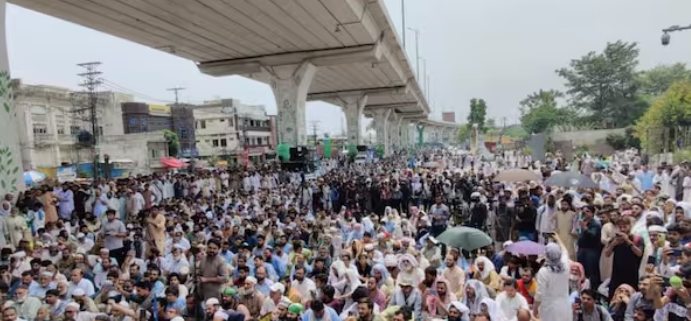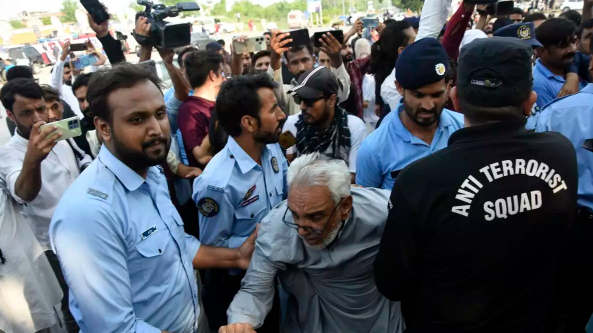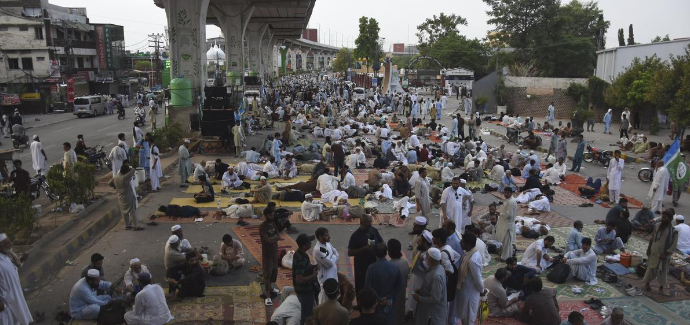Pakistan Right-Wing Party Protests Against Power Tariff Increase:-
Pakistan Right-Wing Party in a powerful display of public dissent, Pakistan’s right-wing party has launched a series of protests against the recent increase in power tariffs. The move has sparked widespread anger and discontent among the population, highlighting the growing frustrations over economic hardships and the government’s handling of the country’s financial crisis. These protests reflect deeper issues within Pakistan’s socio-political landscape and pose significant challenges for the current administration.
Background of Pakistan’s Power Sector
Pakistan’s power sector has long been plagued by inefficiencies, corruption, and chronic underinvestment. The country has struggled with an energy crisis characterized by frequent power outages and an inability to meet the growing demand for electricity. These issues have had severe repercussions on economic growth, industrial productivity, and the daily lives of citizens.
Over the years, successive governments have attempted to address these challenges through various reforms and initiatives, including the privatization of power distribution companies, investments in new power generation projects, and efforts to reduce line losses and improve collection rates. However, these measures have often fallen short due to bureaucratic inertia, political interference, and systemic corruption.  for more information click on this link
for more information click on this link
Recent Tariff Increases
The recent increase in power tariffs comes as part of the government’s efforts to comply with the conditions set by international financial institutions, particularly the International Monetary Fund (IMF), as part of its loan agreements. The IMF has insisted on structural reforms in Pakistan’s energy sector, including the removal of subsidies and the introduction of cost-reflective tariffs, to improve fiscal discipline and reduce the budget deficit.
The government has argued that the tariff increase is necessary to address the financial imbalances in the power sector, reduce circular debt, and ensure the sustainability of energy supplies. However, this decision has been met with fierce opposition from various segments of society, who view it as an additional burden on already strained household budgets.
The Right-Wing Party’s Stance
The right-wing party leading the protests has positioned itself as the voice of the common people, channeling public anger and frustration over rising living costs. The party’s leaders have criticized the government’s decision to increase power tariffs, arguing that it disproportionately affects the poor and middle classes while benefiting wealthy elites and foreign creditors.
In fiery speeches and statements, the party has accused the government of capitulating to the demands of international financial institutions at the expense of the Pakistani people. They have called for immediate rollback of the tariff increase and have demanded greater transparency and accountability in the management of the power sector.
Protests and Public Sentiment
The protests organized by the right-wing party have garnered significant support from various sections of society, including labor unions, trade associations, and civil society groups. Demonstrations have been held in major cities across the country, with participants carrying banners and chanting slogans against the government and the power tariff increase.
Public sentiment has been overwhelmingly supportive of the protests, with many citizens expressing their frustration over rising costs of living, stagnant wages, and the perceived lack of government action to address their economic hardships. Social media platforms have been abuzz with discussions and debates about the power tariff increase, further amplifying the voices of dissent.
Economic Challenges and Policy Dilemmas
The protests against the power tariff increase underscore the broader economic challenges facing Pakistan. The country is grappling with high inflation, a depreciating currency, and a large fiscal deficit. The government is caught in a policy dilemma, balancing the need for fiscal consolidation and structural reforms with the imperative of addressing the immediate concerns of the population.
- Inflation and Cost of Living:
The increase in power tariffs is expected to exacerbate inflationary pressures, as higher energy costs are likely to be passed on to consumers in the form of higher prices for goods and services. This is particularly concerning for lower-income households, who spend a larger proportion of their income on basic necessities.
- Fiscal Deficit and Debt:
Pakistan’s fiscal deficit remains a significant challenge, with the government struggling to raise sufficient revenue to meet its expenditure needs. The power sector’s circular debt, which has ballooned to unsustainable levels, is a major contributor to the fiscal deficit. The government’s decision to increase power tariffs is aimed at reducing this debt, but it has also intensified public discontent.
- Energy Sector Reforms:
Structural reforms in the energy sector are crucial for long-term sustainability, but they are often politically contentious and socially challenging. The removal of subsidies and the introduction of cost-reflective tariffs are necessary steps to ensure the financial viability of the power sector, but they must be accompanied by measures to protect vulnerable populations and improve governance and efficiency in the sector.
Political Implications
The protests against the power tariff increase have significant political implications for the current administration. The right-wing party leading the protests has successfully tapped into public discontent, positioning itself as a formidable opposition force. This has put pressure on the government to address the concerns of the population and reconsider its policy decisions.
- Government Response:
The government has attempted to defend its decision by emphasizing the need for fiscal discipline and the long-term benefits of energy sector reforms. However, it has also recognized the political risks associated with the tariff increase and has sought to mitigate public anger by announcing targeted relief measures for low-income households.
- Opposition Strategies:
The right-wing party’s protests have energized the broader opposition, leading to calls for a united front against the government’s economic policies. This has the potential to create a more challenging political environment for the administration, which is already facing criticism over its handling of the economy and governance issues.
 for more information click on this link
for more information click on this link - Electoral Implications:
The public’s response to the power tariff increase and the ongoing protests could have electoral implications, influencing voter sentiment and shaping the political landscape ahead of future elections. The ability of the right-wing party and other opposition forces to sustain momentum and translate public discontent into political support will be a key factor to watch.
Social and Economic Impact
The social and economic impact of the power tariff increase and the ensuing protests is significant. The increase in energy costs is likely to affect various sectors of the economy, leading to higher production costs and potential job losses in energy-intensive industries. This, in turn, could exacerbate unemployment and poverty levels, Pakistan Right-Wing Party further straining the social fabric.
- Household Budgets:
For many households, the increase in power tariffs represents an additional financial burden, making it harder to meet basic needs. This has led to growing frustration and anger, particularly Pakistan Right-Wing Party among lower-income groups who are already struggling to cope with rising living costs.
- Business Community:
The business community has expressed concerns over the impact of higher energy costs on competitiveness and profitability. Small and medium-sized enterprises (SMEs), in Pakistan Right-Wing Party particular, are likely to be affected, as they have less capacity to absorb increased costs compared to larger firms.
- Social Cohesion:
The protests and public discontent over the power tariff increase have highlighted the growing socio-economic divide in Pakistan. The government’s ability to address these concerns and implement measures to support vulnerable Pakistan Right-Wing Party populations will be crucial in maintaining social cohesion and stability.
Path Forward and Recommendations
Addressing the challenges posed by the power tariff increase and the broader issues in Pakistan’s power sector requires a multifaceted approach. Key recommendations include:
- Targeted Subsidies and Relief Measures:
The government should implement targeted subsidies and relief measures to protect low-income households from the impact of higher energy costs. This could include direct cash transfers, subsidized electricity rates for vulnerable groups, and support for energy Pakistan Right-Wing Party efficiency improvements.
- Improving Energy Sector Governance:
Enhancing governance and reducing corruption in the energy sector are critical for improving efficiency and financial sustainability. This includes strengthening regulatory oversight, increasing transparency in tariff-setting processes, and holding accountable those responsible for mismanagement and malpractices.
 for more information click on this link
for more information click on this link - Diversifying Energy Sources:
Investing in renewable energy sources and diversifying the energy mix can help reduce reliance on expensive imported fuels and lower the overall cost of electricity. Promoting the development of solar, wind, and hydropower projects can contribute to a more sustainable and affordable energy future.
- Engaging Stakeholders:
Engaging with stakeholders, including political parties, civil society, Pakistan Right-Wing Party and the business community, is essential for building consensus and support for energy sector reforms. Transparent communication and inclusive decision-making processes can help address concerns and ensure that reforms are implemented effectively.
- Strengthening Social Safety Nets:
Expanding and strengthening social safety nets is crucial for mitigating the social impact of economic reforms. This includes enhancing social protection programs, improving access to healthcare and education, and creating opportunities for skills development and Pakistan Right-Wing Party employment.
Conclusion
The protests against the power tariff increase in Pakistan underscore the deep-seated economic challenges and social tensions facing the country. Pakistan Right-Wing Party While the government’s efforts to address fiscal imbalances and reform the energy sector are necessary, they must be balanced with measures to protect vulnerable populations and ensure social stability.
The right-wing party’s protests have highlighted the growing public discontent and the need for a more inclusive and transparent approach to policymaking. Addressing these challenges requires a multifaceted strategy that includes targeted relief measures, improved governance, and sustained engagement with stakeholders.
As Pakistan navigates this complex and contentious issue, the ability of the government to balance economic reforms with social protection and political stability will be critical in shaping the country’s future trajectory. The path forward demands a commitment to transparency, accountability, and the well-being of all citizens, ensuring that the benefits of economic reforms are shared equitably and sustainably. ALSO READ:- Blinken Meets Wang, Flags China’s Actions Surrounding Taiwan 2024




